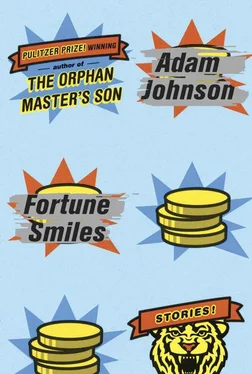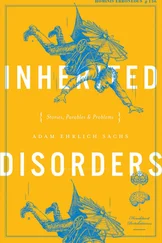“I heard you playing the other day, in Anguk Station,” he said when he caught up.
She gave him a look that was either suspicious or curious.
“You’re very talented,” he told her.
She didn’t respond.
“Did you go to Mangyongdae or the conservatory?”
“I taught children propaganda songs all day,” she said. “You need to know accordion to do that.”
A squadron of obsolete fighter jets guarded the park entrance. They were mounted on grand pedestals, their nose cones pointing north. Mina turned in to the park and walked along a snow-flurried trail. “Your teachers didn’t play the accordion?” she asked.
DJ shook his head.
“Where are you from?”
“Pyongyang.”
“I thought I heard your accent,” she said. “Maybe kids actually learned in Pyongyang. Where I’m from, it worked differently. Men came into my high school. They divided the girls into beautiful and not so beautiful. The beautiful girls were sent away. We got accordions. And that was that. How much you hated the accordion didn’t matter at all.”
DJ wanted to tell her he thought she was very beautiful, but he kept quiet. He wanted to ask her why she risked her life to defect with an instrument she hated, but he didn’t.
They came to a group of women, bundled against the cold, doing some kind of slow-motion dance. They moved in unison, a hand taking forever to pass before the eyes, a foot lifting, seeming never to be set down. DJ and Mina exchanged a look. Then they walked on, to keep from laughing.
After a while, Mina said, “At Hanawon, you were with an older man. Was he your father?”
DJ hadn’t seen his parents since he’d received his engineering degree. They were like the memory of a photograph to him, an image stared at so long that, before it was lost, it had begun to replace the real thing.
“That was Sun-ho,” he said. “We worked together, generating foreign currency.”
The look Mina gave him was clearly suspicious.
“It was nothing dangerous,” DJ said. “Cars were stolen in Japan, shipped to Vladivostok, doctored in Chongjin, then hauled north by train, where the Chinese forged new documents. Other people got rich. We got to eat.”
They started moving toward an outdoor ice rink. Groups of teens and couples skated counter-clockwise, some dancing to a kind of music DJ hadn’t heard before.
DJ asked, “Does no one recognize the songs you play?”
“Only North Koreans,” Mina said.
“You ever run across people you knew in the North?”
“A few.”
“But not the one you’re looking for.”
She shook her head.
Soon they were leaning against the dasher boards, watching the skaters carve the ice. The music was loud, so you couldn’t hear the best part — the blades scissoring the curves. The guy who was making the music wore headphones and fingerless gloves so that he could work a panel of knobs and turn records by hand.
“I’d like to hear you play sometime.”
Mina looked toward the families skating ahead. “You can if you want,” she said. “But you should know that when I play, I play for my husband.”
DJ offered his best attempt at a smile.
A teen beside them was moving to the beat.
“What’s the name of this music?” DJ asked him.
The teen stopped swaying when he heard DJ’s accent. “You’d have to ask the DJ,” he said.
DJ didn’t understand.
“You’re from the North, right?” the teen asked.
DJ nodded.
“Do you have DJs there? Do you know what I’m talking about?”
“DJs?”
“How to explain a DJ?” the teen asked himself. “The DJ, he’s a kind of artist. He takes different kinds of music, you know, funky and strange and old-fashioned, even bad music, music you wouldn’t normally like. Then he mixes it all together. That mix, that’s the DJ’s brand, that’s who he is.”
—
On Friday, DJ went to meet Sun-ho at an American chain called Burger King. As he opened the door, however, Sun-ho came walking out with three Whopper meals in takeaway bags.
“Who’s the other meal for?” DJ asked.
“Come,” Sun-ho said. “I need to show you something.”
With his lurching step and slow foot drag, he led the way.
Two blocks later, they were standing before a 2002 Corolla.
DJ knew his Toyotas. “The LE sedan,” he said. “With the upgrade.”
“Go ahead,” Sun-ho said. “Check it.”
DJ bent low and inspected the tailpipe — sure enough, it was notched. They did this to keep track of which cars they’d modified. When he rose, he was smiling.
“I was walking down the street, and there it was,” Sun-ho said. “Imagine its journey — Niigata to Vladivostok to Chongjin to Shenyang to Seoul to us.”
He used a master key to open the driver’s door, and the two stepped inside.
Before closing the passenger door, DJ scraped a pile of textbooks onto the curb. Out of habit, he flipped down the visor, lifted the floor mat, opened the glove box. Their greatest source of wonder was the things you might find in a Japanese car — aside from food and money, they’d once found a bullhorn, an inflatable woman, a cooler containing a single eyeball. They’d even found a kitten once, living in the trunk off old apples.
The three meals sat between them. DJ looked from the extra bag to Sun-ho.
“I’ll tell you who the extra burger’s for,” Sun-ho said. “First we need to make a stop.”
They drove toward the university hospital in Sinchon-dong. Crossing Olympic, DJ realized that by taking the subway everywhere, he had never really seen the city. From the elevated causeway, here were Yeouido, the National Assembly buildings and the tourist boats lining the Hangang. Climbing the Seogang Bridge, he saw for the first time the Bamseom Islets, with great flocks of mallards and mandarins basking in the midday light.
At the hospital, Sun-ho parked across the entrance to the emergency room, blocking the ambulance ramp. “I’ll be back soon enough,” he said, slowly limping toward the ER doors.
DJ leaned to inspect the odometer, which registered a mere twenty-seven thousand kilometers. Then he rapped his knuckles where the passenger-side airbag should have been: hollow.
Soon enough, he saw two security guards escorting a man from the hospital who gripped several dozen balloons. The guards tried to wrest the balloon strings from the man’s hands, and when they couldn’t, they pushed him to the ground.
By the time Sun-ho had made it back to the car, he was livid, barking insults toward the maternity ward as he set about stuffing It’s A Boy! balloons into the backseat. “I would have given them their stupid money!” Sun-ho shouted. “Do they think fifty baby boys will be born in a single night? No, it’s impossible, so why does the gift shop need all these balloons?”
DJ had no idea what Sun-ho was talking about, but he now knew whom the extra meal was for. “The burger will never get to her,” DJ said. “You understand that, right?”
Sun-ho turned his anger toward DJ. “It doesn’t matter if Willow gets the burger,” he said. “What matters is that we sent it.”
They headed north on Highway 1, toward the DMZ, with Sun-ho at the wheel. He drove like he was in North Korea, racing down empty roads a hundred meters wide with a free pass from the dictator himself.
“Yesu-Nim!” DJ shouted as the car floated across lanes of thick traffic.
He turned to see if they’d caused an accident, but there was only a wall of balloons.
When he turned back, Sun-ho was glaring at him.
“Yesu-Nim?” he asked, shaking his head.
“You have to be careful,” DJ said. “This is the one car in South Korea that has no airbags.”
Читать дальше












